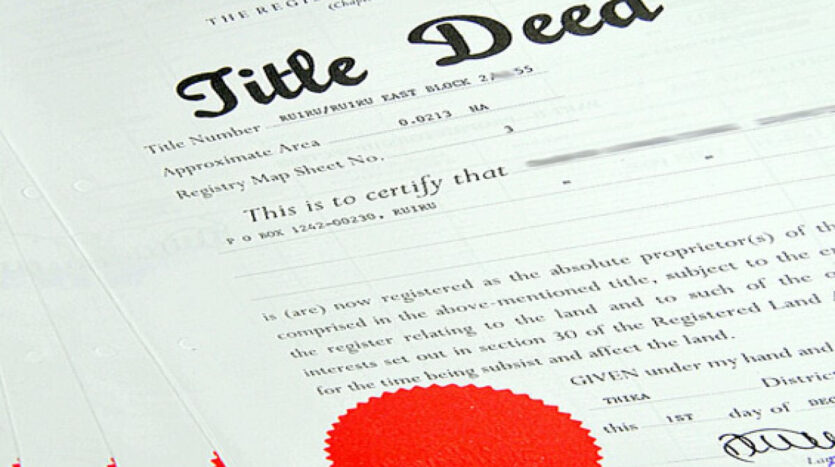Title Deed Verification in Kenya: Documents You Must Check
Introduction
Property fraud is a growing concern in Kenya, making title deed verification one of the most critical steps in any real estate transaction. Before buying land or a house, you must ensure that the documents provided are genuine, valid, and free from disputes. This guide outlines the key property documents in Kenya you must check during the verification process.
Why Title Deed Verification in Kenya is Important
- Protects against fraud: Prevents scams involving fake or duplicate titles.
- Confirms ownership: Ensures the seller is the rightful registered owner.
- Reveals encumbrances: Discloses whether the property has loans, caveats, or disputes.
- Builds trust: Gives buyers confidence before investing millions of shillings.
For related insights, see our guide on real estate mistakes to avoid in Kenya.
Documents to Check During Title Deed Verification in Kenya
1. Original Title Deed
- Verify the authenticity of the original title deed.
- Check the name of the registered owner and ensure it matches the seller’s ID.
- Confirm the parcel number and location.
2. Search Results from Ministry of Lands (ArdhiSasa)
- Conduct an official ArdhiSasa land search using the title number.
- Ensure the ownership details match the seller’s records.
- Check for any encumbrances, charges, or caveats.
3. Seller’s Identification Documents
- National ID or passport of the seller.
- KRA PIN certificate.
- Ensure the names match the title deed and search results.
4. Land Rent and Rates Clearance Certificates
- For leasehold properties, confirm the land rent is fully paid.
- Obtain a rates clearance certificate from the county government.
- These ensure the property is not burdened with arrears.
5. Survey Maps and Mutation Documents
- Obtain survey maps from Survey of Kenya.
- Confirm boundaries, acreage, and parcel number.
- Cross-check with the physical land on the ground.
6. Spousal Consent (if applicable)
- For matrimonial property, the seller must provide written spousal consent.
- This prevents future disputes and legal nullifications.
7. Sale Agreement
- Ensure a written sale agreement is drafted by an advocate.
- It should outline terms, price, deposit, completion period, and obligations.
For financing after verification, see our guide on finance for property purchases in Kenya.
Common Mistakes Buyers Make
- Accepting photocopies instead of original documents.
- Skipping official searches to save time or money.
- Relying solely on brokers without legal verification.
- Ignoring encumbrances listed in the search results.
- Failing to engage a qualified property advocate.
Frequently Asked Questions
How can I confirm if a title deed in Kenya is genuine?
By conducting an official land search on ArdhiSasa and cross-checking with original documents.
What documents are required for property transfer in Kenya?
Original title deed, seller’s ID & KRA PIN, sale agreement, and clearance certificates.
Can a foreigner verify a title deed in Kenya?
Yes. Foreign buyers can conduct land searches through ArdhiSasa like any Kenyan.
What happens if the title has encumbrances?
The buyer must ensure all charges, caveats, or disputes are cleared before purchase.
Do I need an advocate for title deed verification?
Yes. A licensed advocate ensures due diligence and protects your legal rights.
Final Thoughts
Title deed verification in Kenya is not optional — it is a must. By checking the right property documents in Kenya, buyers can avoid fraud, confirm ownership, and protect their investments.
At Sarabi Realty Group, we help clients navigate every step of property verification, ensuring safe and secure transactions. Ready to buy property with confidence? Contact us today.

